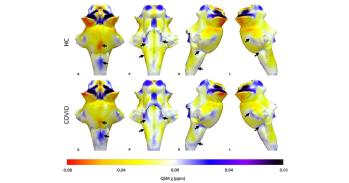
A team of scientists from Cambridge and Sweden have discovered a molecule that can prevent a toxic protein involved Alzheimer's disease from building up in the brain.
A team of scientists from Cambridge and Sweden have discovered a molecule that can prevent a toxic protein involved Alzheimer's disease from building up in the brain.
When we examined these flies we found that the Affibody not only prevented and reversed the formation of Aβ clumps, it also promoted clearance of the toxic Aβ clumps from the flies' brains.
Dr Leila Luheshi
They found that in test tube studies the molecule not only prevents the protein from forming clumps but can also reverse this process. Then, using fruit flies with Alzheimer’s disease, they showed that the same molecule effectively “cures” the insects of the disease.
Alzheimer's disease is the most common neurodegenerative disorder and is linked to the misfolding and aggregation of a small protein known as the amyloid β (Aβ) peptide. Previous studies in animal models have shown that aggregation of Aβ damages neurones (brain cells) causing memory impairment and cognitive deficits similar to those seen in patients with Alzheimer's disease. The mechanisms underlying this damage are, however, still not understood.
The new molecule - designed by scientists in Sweden - is a small protein known as an Affibody (an engineered binding protein). In this new study, researchers at the University of Cambridge and the Swedish University of Agricultural Sciences found that in test-tube experiments this protein binds to the Aβ peptide, preventing it from forming clumps and breaking up any clumps already present.
In a second experiment, they studied the effect of this Affibody in a Drosophila (fruit fly) model of Alzheimer's disease previously developed at Cambridge.
Working with fruit flies that develop the fly equivalent of Alzheimer's because they have been genetically engineered to produce the Aβ protein, they crossed these flies with a second line of flies genetically engineered to produce the Affibody.
They found that offspring - despite producing the Aβ protein - did not develop the symptoms of Alzheimer's disease.
According to lead author Dr Leila Luheshi of the Department of Genetics at University of Cambridge: "When we examined these flies we found that the Affibody not only prevented and reversed the formation of Aβ clumps, it also promoted clearance of the toxic Aβ clumps from the flies' brains."
"Finding a way of preventing these clumps from forming in the brain, and being able to get rid of them, is a promising strategy for preventing Alzheimer's disease. Affibody proteins give us a window into the Alzheimer's brain: by helping us understand how these clumps damage brain cells, they should help us unravel the Alzheimer's disease process."
According to Professor Torleif Härd of the Swedish University of Agricultural Sciences and one of the senior authors of the study: "Our work shows that protein engineering could open up new possibilities in Alzheimer's therapy development."
The study is published today in PLoS Biology.
The image shows the structure of two Affibody protein molecules (in blue and cyan) bound to an Aβ molecule (in orange and red). It shows how the Affibody molecules enclose Aβ in a tunnel and protect it from interacting and aggregating with other Aβ molecules. Copyright Professor Torleif Härd, Swedish University of Agricultural Sciences.
This work is licensed under a Creative Commons Licence. If you use this content on your site please link back to this page.





